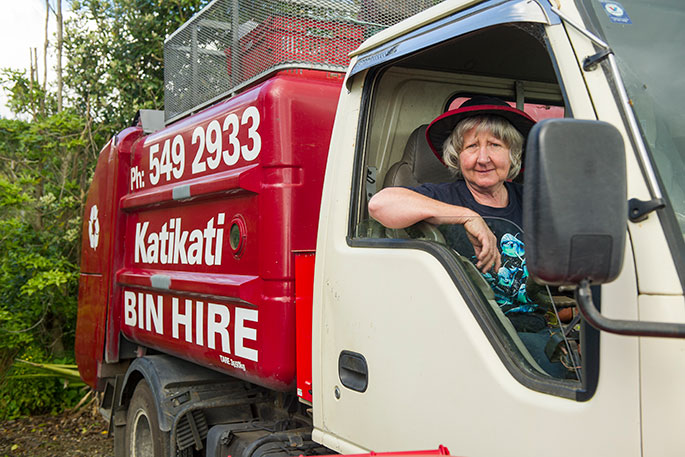'My solution is leave it the way it is.”
It's advice born of 17 years' experience in the rubbish collection industry. 'I haven't been operating all that time unsuccessfully,” says Marion Hall, who with husband Tony, runs Katikati Bin Hire.
'And I didn't win best customer service person at the local Katikati awards because people were unhappy with the service I provide them.”
And so, armed with those credentials, and an HT licence, Marion is telling the Western Bay of Plenty District Council, and anyone advocating changes to the way the district disposes of its rubbish, to leave well alone.
'Then we won't have any rate increases, people will continue to have options and everyone is happy.”
The red rubbish bag lady from Katikati was taking aim at a Tauranga man who recently appeared in The Weekend Sun with an imported solution to Tauranga's continuing waste woes.
He proposes the council provide three wheelie bins to each householder – a red one for landfill rubbish collected weekly, a yellow one for recycling collected every second week and a green one for compostable waste, collected alternate weeks between yellow bin collections.
The idea comes from the North Sydney shire of Hornsby, where the council took back control of its rubbish, gave everyone three wheelie bins, imposed a standard annual fee of $400 and a $90 availability charge, and now just one truck, rather than a convoy, drops by to empty the bins.
Western Bay of Plenty District Council is reviewing its waste management and minimisation plan, and jointly with its Tauranga neighbours, has a vision of minimising the amount of waste that goes to landfill.
They've been consulting with their various communities about the future of waste management in the Western Bay – and one option is council led kerbside recycling and rubbish collections. Possibly like Hornsby. It's an issue that is open for consultation.
And just this week, a Tauranga City Council committee voted to recommend council support a proposal for rates-funded kerbside collections to be written into its draft long term plan.
'Tauranga's looking at a one size fits all,” says Marion. ”But one size doesn't fit all. And I would like to think Western Bay might be a bit more realistic about it not being a good idea.”
Her point being Hornsby is a suburb of 22,000, and it doesn't have a huge rural population like the Western Bay.
There are very long driveways. 'So how many people in the Western Bay of Plenty would want to drag three wheelie bins a few hundred metres down a long driveway by 7:30 in the morning? None!” she claims.
'I can say that, because if they wanted to, they would be using the wheelie bin contractors now and not me. And they're using me.”
Marion and Tony supply their customers with a 44 gallon drum. 'We drive up the driveway, negotiate the three cars in the drive, the bikes left on the driveway and the dog on the chain and empty the bin when it's full and when the client wants it emptied. Clients want that level of service and will pay for it.”
And those same customers pay as they go. 'They don't pay a year in advance for a service they may not use. They only pay for what we remove. What happens if you pay up front and then swan off in your camper van for three months and don't use the service?” Those people just call Marion and say don't come. 'It works,” she says.
It's a system which Marion insists encourages waste reduction, because customers only pay for the waste they create. 'If it was weekly and rates funded they would make sure their bins were full. And not necessarily with the material that's supposed to be in them.”
Rural people, says Marion, don't need a food scraps and garden waste bin. 'Full stop!” Most of them would have 'gobbledy-gutses”, compost bins or worm farms.
And she has clients who use just one of her red kerbside bags a month. 'We're talking rates funded here and my old dears don't want to spend hundreds of dollars a year - and it will be hundreds of dollars - when at the moment they're spending $35 to get rid of their rubbish.”
According to Marion, they don't have enough rubbish for a weekly collection, quite likely not enough for a fortnightly collection, and are more likely to use the service once a month. 'So again, it's people paying for a service they don't need or want, and people who can't afford a rate increase in a district which already has exorbitant rates.”
Katikati is still very much small, rural New Zealand – 'So we have that loyalty thing,” says Marion. 'And we look after them too.” Like providing and clearing rubbish bins for local events like the Pahoia School ag day, the Kennel Club at Uretara Domain and the Omokoroa Coastal Challenge.
Marion, the red kerbside rubbish bag lady from Katikati, says it's about having options. 'And at the moment people have those options,” she says. 'The current system is working and you would be creating a nightmare to change it.”
When you call Katikati Bins, Marion's voice comes up. 'I am currently out of action with a broken arm.” Her horse kicked her. 'Tony is doing the rounds on his own so please bear with us.”
It's those personal touches, the connection with the client, that Marion fears will go out in the wheelie bin if the system changes.

